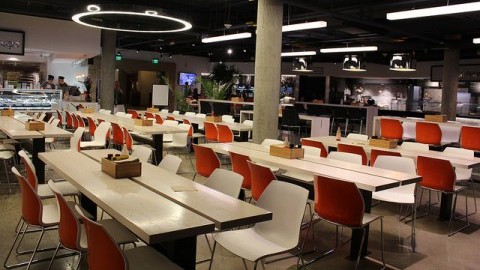On March 1, the University of Massachusetts decided to open up dine-in service in the three dining commons: Worcester, Berkshire and Hampshire, as well as Blue Wall. According to the email sent out from UMass Dining on Feb. 27, all students are required to present a green checkmark before entering, which ensures that students are tested twice per week.. Strict adherence to social distancing is required, and facemasks must be worn when not eating. Additionally, the dining team strongly enforces a 30-minute slot for each seating section to be open at a time, to abide by sanitization protocols.
According to “Dine with Confidence” Resource Center, UMass Dining’s commitment is to “serve healthy, sustainable and delicious meals utilizing best safety practices.”
To ensure safety for students, UMass Dining implemented capacity limits, zone seating, professional directional signage in all locations and increased staff to monitor all dining activities, as stated by the dining team in the email.
Despite the assurance that the dining team gave students, some were still concerned. Brandon Lutz, a freshman in public health, showed dissatisfaction with UMass’ decision.
“The CDC has just recently linked bars and restaurants as one of the main contributors to COVID-19 spread, and we know that mask-less gatherings are main source of transmission,” he said.
Lutz stated that he “doesn’t understand the logic” behind UMass failing to open the Recreation Center or allow in-person club meetings, but prioritizing in-person dining. “Studies have shown that gyms are linked with little to no significant viral spread,” he said.
Lutz also noted that “punishing individuals who are masked in dorm common spaces” contradicts the decision to open in-person dining.
Lutz concluded that UMass is “objectively ignoring the COVID-19 virus” by allowing in-person dining.
Although some students expressed frustration with UMass’ decision, the University promises to fulfill safety protocols, including “enhanced cleaning procedures, staff training programs as well as evaluation tools,” as the “Dine with Confidence” statement guarantees.
Chris Brady, a freshman economics major, took a slightly different approach. “I’m unclear if it’s ‘safe’ or not, but apparently it complies with state guidelines so that’s good enough for me.”
However, five days following the opening of in-person dining, the co-directors of the Public Health Promotion Center sent out an email to the student body revealing concern about a 24 percent increase of positive cases compared to last week.
“It is vitally important that our community remain vigilant,” said Jeffrey Hescock, executive director of environmental health and safety, and Ann Becker, public health director. “Our data analysis shows that most of the cases result from students participating in small and large gatherings, both on and off campus.”
Hescock and Becker warn that a continuation of student gatherings will result in the campus facing a new surge and “the need to reimpose additional restrictions.”
Rachael Dionisio can be reached at [email protected].



















